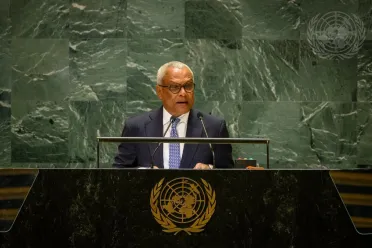Statement
Statement summary
JOSÉ MARIA PEREIRA NEVES, President of Cabo Verde, said that numerous armed conflicts continue to ravage various regions with devastating impacts on the populations, particularly in the Middle East. He urged all parties to spare no effort to put an end to these conflicts, to commit to dialogue and uphold the values enshrined in the Charter of the United Nations, international law and humanitarian law. He also confirmed commitment to achieving the SDGs, the 2030 Agenda for Sustainable Development and the African Union Agenda 2063. “This year, we proudly received the certification from the World Health Organization (WHO) as a malaria-free country,” he emphasized, adding that many nations, especially in Africa, are still grappling with this terrible disease, while microbial pathogens and antimicrobial resistance also pose significant threats to global health. “I reaffirm Cabo Verde’s firm commitment to being an active and constructive member of the United Nations, tirelessly championing the universal values contained in its Charter,” he said.
Speaking about climate change that disproportionately affects vulnerable nations, especially small island developing States, he stressed that people in these States seek bolder commitments from high-emission countries and swift implementation of climate policies and funding mechanisms. “The rising sea levels, also caused by climate change, require immediate and special attention — the challenge is multidimensional and extends far beyond island and coastal populations: it affects all continents and regions, leaving no one immune to this catastrophe in the making,” he said, welcoming today’s high-level meeting on Addressing the Existential Threats Posed by Sea-level Rise.
“As an Ocean Nation, Cabo Verde has a tiny land territory in comparison to the immensity of its maritime territory,” he recalled, spotlighting that he accepted the United Nations Educational, Scientific and Cultural Organization’s (UNESCO) invitation to become a Patron of the United Nations Decade of Ocean Science Alliance for Sustainable Development (2021-2030). He recalled that for three consecutive years, Cabo Verde has hosted international Ocean Conferences to foster partnerships between Governments, the private sector, scientists and civil society, and in 2025 it will host a high-level meeting for the Atlantic, Indian Ocean and South China Sea regions. “Even if we dedicated our entire State budget to sustainable development and climate action, it would still fall short of the necessary funding targets,” he emphasized, urging to scale up technical assistance and capacity-building efforts in financing sustainable development to ensure that the Global South is not left behind.
Speaking in his capacity as the African Union Champion for Natural and Cultural Heritage, he said he has been tirelessly advocating for the protection, promotion and sustainable management of Africa’s rich natural and cultural heritage, which is highly vulnerable to climate change. “The restitution of cultural assets — such as artifacts, works of art and sacred objects — which are an integral part of the cultural identity, history and traditions of the communities from which they originate, is of vital importance not only for Africa but for many other regions of the world,” he stated, underscoring that their removal has disrupted cultural continuity, and their return would allow the preservation of their cultural and spiritual integrity. He also announced a high-level meeting in 2025 in Cabo Verde focused on Atlantic Creoleness, bringing together scholars of Creole languages, artists, writers, filmmakers, men and women of culture and world leaders to enhance initiatives like the Slave Route Project and the Decade of People of African Descent.
Off the Atlantic coast of Africa, President of Cabo Verde, José Maria Pereira Neves, emphasized that while small island States are the first affected by climate change, the impacts extend deep into the hinterlands.
“No one immune to this catastrophe in the making,” he said, urging immediate attention to rising sea levels.
The challenge is multidimensional and extends far beyond island and coastal populations, affecting all continents and regions, he added, welcoming the high-level meeting on Addressing the Existential Threats Posed by Sea-level Rise, held earlier in the day.
He also noted the disproportionate impacts of climate change on vulnerable nations, especially small islands and urged bolder commitments from high-emission countries as well as swift implementation of climate policies and funding mechanisms.

